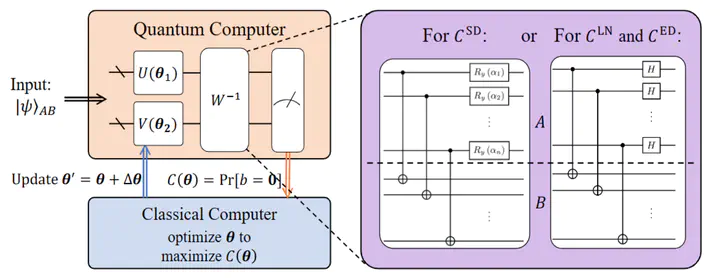Abstract
Entanglement plays a crucial role in quantum physics and is the key resource in quantum information processing. However, entanglement detection and quantification are believed to be hard due to the operational impracticality of existing methods. This work proposes three near-term efficient algorithms that exploit the hybrid quantum-classical technique to address this difficulty. The first algorithm finds the Schmidt decomposition—a powerful tool to analyze the properties and structure of entanglement—for bipartite pure states. While the logarithm negativity can be calculated from the Schmidt decomposition, we propose the second algorithm to estimate the logarithm negativity for bipartite pure states, where the width of the parameterized quantum circuits is further reduced. Finally, we generalize our framework for mixed states, leading to our third algorithm that detects entanglement on specific families of states, and determines distillability in general. All three algorithms share a similar framework where the optimizations are accomplished by maximizing a cost function utilizing local parameterized quantum circuits, with better hardware efficiency and practicality compared to existing methods. The experimental implementation on Quantum Leaf using the Institute of Physics, Chinese Academy of Sciences superconducting quantum processor exhibits the validity and practicality of our methods for analyzing and quantifying entanglement on near-term quantum devices.
Publication
Physical Review Applied

Visiting Scholar
I received my doctorate in Mathematics from the University of Copenhagen in 2025, under the supervision of Prof. Laura Mancinska. Previously I obtained my master’s and bachelor’s degrees in 2020 and 2017 respectively, both in electronic engineering from Beihang University. My research interests include quantum information theory, Bell non-locality and quantum machine learning.

Visiting Scholar
I obtained my MS degree in Physics from Imperial College London. I was an intern at Baidu Research under the supervision of Prof. Xin Wang. I obtained my PhD degree in quantum information at Osaka University. My research interests include quantum error mitigation, quantum information theory and quantum computation.

Associate Professor
Prof. Xin Wang founded the QuAIR lab at HKUST(Guangzhou) in June 2023. His research primarily focuses on better understanding the limits of information processing with quantum systems and the power of quantum artificial intelligence. Prior to establishing the QuAIR lab, Prof. Wang was a Staff Researcher at the Institute for Quantum Computing at Baidu Research, where he concentrated on quantum computing research and the development of the Baidu Quantum Platform. Notably, he spearheaded the development of Paddle Quantum, a Python library designed for quantum machine learning. From 2018 to 2019, Prof. Wang held the position of Hartree Postdoctoral Fellow at the Joint Center for Quantum Information and Computer Science (QuICS) at the University of Maryland, College Park. He earned his doctorate in quantum information from the University of Technology Sydney in 2018, under the guidance of Prof. Runyao Duan and Prof. Andreas Winter. In 2014, Prof. Wang obtained his B.S. in mathematics (with Wu Yuzhang Honor) from Sichuan University.
 Variational quantum algorithms for Schmidt decomposition and logarithm negativity.
Variational quantum algorithms for Schmidt decomposition and logarithm negativity.